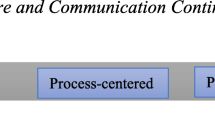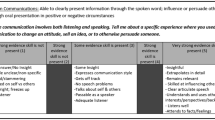Abstract
Objective
The authors developed and tested the feasibility and utility of a new direct-observation instrument to assess trainee performance of a medication management session.
Methods
The Psychopharmacotherapy-Structured Clinical Observation (P-SCO) instrument was developed based on multiple sources of expertise and then implemented in 4 university-based outpatient medication management clinics with 7 faculty supervising 17 third-year residents. After each observation by a faculty member of a medication management session, residents received feedback in writing (the completed P-SCO) and verbally in person. Targets were 8 P-SCO observations per academic year per resident (or 0.67 per month) and 16 observations per year completed by each faculty (or 1.3 per month). Qualitative thematic analysis was employed to compare the frequency, specificity, type (reinforcing vs. corrective), and content of comments documented on the P-SCO forms to midpoint and end of rotation global assessments by the same faculty for the same residents in the same rotation.
Results
Faculty completed 2.4 (SD=1,2) P-SCOs per month during the study period. Each resident received 1.1 (SD=0.53) P-SCO observations per month. Faculty and residents completed significantly more observations than targeted (p=0.03 and p=0.003, respectively). Two percent of the P-SCOs had no written comments. Less than 3% of the P-SCO comments were nonspecific compared with 43% for the global assessments. Residents received, on average, 3.3 times more total, 2.6 times more reinforcing, and 5.3 times more corrective patient care specific comments on the P-SCO than on the global assessment (p<0.001). For the numerical ratings, residents received an average of 4.2 “exceeds expectations” and 1.7 “below expectations” ratings on P-SCOs compared with 2.6 and 0, respectively, on global assessments (p<0.02).
Conclusion
Faculty can feasibly use the P-SCO instrument in a training clinic. Compared with traditional global assessment, the P-SCO provided much more specific feedback information, a better balance of corrective to re-enforcing comments, and a greater spread of ratings related to competency in pharmacodverbally
Similar content being viewed by others
References
Mojtabai R, Olfson M: National trends in psychotherapy by office-based psychiatrists. Arch Gen Psychiatry 2008; 65: 962–970
US Institute of Medicine: Committee on Crossing the Quality Chasm: adaptation to mental health and addictive disorders, improving the quality of health care for mental and substance-use conditions. Quality Chasm Series. Washington, DC, National Academies Press, 2006
Daelmans HE, Overmeer RM, van der Hem-Stokroos HH, et al: In-training assessment: qualitative study of effects on supervision and feedback in an undergraduate clinical rotation. Med Educ 2006; 40:51–58
Daelmans HE, van der Hem-Stokroos HH, Hoogenboom RJ, et al: Feasibility and reliability of an in-training assessment programme in an undergraduate clerkship. Med Educ 2004; 38:1270–1277
Turnbull J, MacFadyen J, Van Barneveld C, et al: Clinical work sampling: a new approach to the problem of in-training evaluation. J Gen Intern Med 2000; 15:556–561
Hays R, Wellard R: In-training assessment in postgraduate training for general practice. Med Educ 1998; 32:507–513
Dunnington G, Reisner L, Witzke D, et al: Structured single-observer methods of evaluation for the assessment of ward performance on the surgical clerkship. Am J Surg 1990; 159:423–426
Wass V, Jolly B: Does observation add to the validity of the long case? Med Educ 2001; 35:729–734
Downing SM: Validity: on meaningful interpretation of assessment data. Med Educ 2003; 37:830–837
Irby DM: What clinical teachers in medicine need to know. Acad Med 1994; 69:333–342
Schum TR, Krippendorf RL, Biernat KA: Simple feedback notes enhance specificity of feedback to learners. Ambul Pediatr 2003; 3:9–11
Schatzberg AF, Nemeroff CB: The American Psychiatric Publishing Textbook of Psychopharmacology, 3rd ed. Washington, DC, American Psychiatric Publishing, 2004
Janicak PG, Davis JM, Preskorn SH, et al: Principles and Practice of Psychopharmacotherapy, 4th ed. Philadelphia, Lippincott Williams & Wilkins, 2006
Scheiber SC, Kramer TAM: Core Competencies for Psychiatric Practice: What Clinicians Need To Know: A Report of the American Board of Psychiatry and Neurology, 1st ed. Washington, DC, American Psychiatric Publishing, 2003
ACGME: ACGME Psychiatry Program Requirements, 2007. Available at http://www.acgme.org/acWebsite/navPages/nav_400.asp
Fawcett J, Epstein P, Fiester SJ, et al: Clinical management: imipramine/placebo administration manual. NIMH Treatment of Depression Collaborative Res Program. Psychopharmacol Bull 1987; 23:309–324
Miller M: Medication Clinic Training Procedures and Treatment Manual. Pittsburgh, University of Pittsburgh Medical Center Late-Life Depression Prevention Clinic, 1998, pp 1–21
Miller MD, Frank E, Reynolds CF 3rd: The art of clinical management in pharmacologic trials with depressed elderly patients: lessons from the Pittsburgh Study of Maintenance Therapies in Late-Life Depression. Am J Geriatr Psychiatry 1999; 7:228–234
Elstein AS, Shulman LS, Sprafka SA: Medical problem solving: an analysis of clinical reasoning. Cambridge, Mass, Harvard University Press, 1978, pp xvi, 330
Williams RG, Dunnington GL, Klamen DL: Forecasting residents’ performance-partly cloudy. Acad Med 2005; 80:415–422
Norcini JJ, Blank LL, Arnold GK, et al: The mini-CEX (clinical evaluation exercise): a preliminary investigation. Ann Intern Med 1995; 123:795–799
Kroboth FJ, Hanusa BH, Parker S, et al: The inter-rater reliability and internal consistency of a clinical evaluation exercise. J Gen Intern Med 1992; 7:174–179
Wilkinson TJ, Campbell PJ, Judd SJ: Reliability of the long case. Med Educ 2008; 42:887–893
Salerno SM, Jackson JL, O’Malley PG: Interactive faculty development seminars improve the quality of written feedback in ambulatory teaching. J Gen Intern Med 2003; 18: 831–834
Ende J: Feedback in clinical medical education. JAMA 1983; 250:777–781
Smith CS, Francovich C, Gieselman J, et al: A broader theoretical model for feedback in ambulatory care. Adv Health Sci Educ Theory Pract 1998; 3:133–140
Hewson MG, Little ML: Giving feedback in medical education: verification of recommended techniques. J Gen Intern Med 1998; 13:111–116
Heidenreich C, Lye P, Simpson D, et al: The search for effective and efficient ambulatory teaching methods through the literature. Pediatrics 2000; 105(part 3):231–237
Lye PS, Biernat KA, Bragg DS, et al: A pleasure to work with: an analysis of written comments on student evaluations. Ambul Pediatr 2001; 1:128–131
Paukert JL, Richards ML, Olney C: An encounter card system for increasing feedback to students. Am J Surg 2002; 183:300–304
Holmboe ES, Fiebach NH, Galaty LA, et al: Effectiveness of a focused educational intervention on resident evaluations from faculty a randomized controlled trial. J Gen Intern Med 2001; 16:427–434
Holmboe ES, Yepes M, Williams F, et al: Feedback and the mini clinical evaluation exercise. J Gen Intern Med 2004; 19(part 2):558–561
Author information
Authors and Affiliations
Corresponding author
Rights and permissions
About this article
Cite this article
Young, J.Q., Lieu, S., O’Sullivan, P. et al. Development and Initial Testing of a Structured Clinical Observation Tool to Assess Pharmacotherapy Competence. Acad Psychiatry 35, 27–34 (2011). https://doi.org/10.1176/appi.ap.35.1.27
Received:
Accepted:
Published:
Issue Date:
DOI: https://doi.org/10.1176/appi.ap.35.1.27




